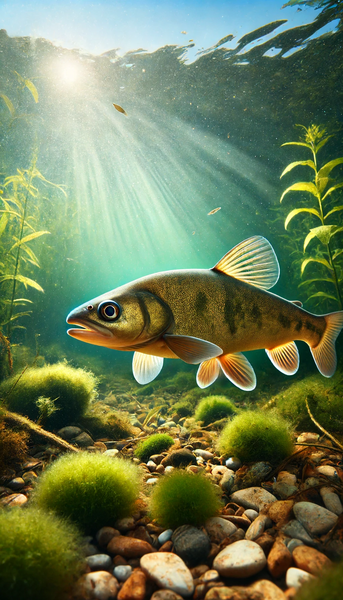Tench

What is the tench?
An inhabitant of our waters
The tench (Tinca tinca) is a freshwater fish native to Europe and parts of Asia that lives mainly in stagnant or slow-flowing waters. Characteristic of this fish is its mud-green color and greasy skin, which protects it from parasites and infections. The tench is a bottom-dwelling fish that feeds on insect larvae, small invertebrates and plant material.
Nutritional profile
Tench is a good source of protein and contains important omega-3 fatty acids, which are essential for the health of dogs. These fatty acids contribute to brain health, support the cardiovascular system and promote a healthy coat.
Benefits of tench in dog nutrition
High-quality proteins
Protein is the building block of any diet and is particularly important for active and growing dogs. Tench provides an excellent source of protein that is easily digestible and contributes to muscle development and maintenance.
Rich in omega-3 fatty acids
The omega-3 fatty acids contained in tench are known for their anti-inflammatory properties. They can help alleviate skin conditions, support cognitive function and promote heart health.
Natural source of vitamins and minerals
In addition to protein and fatty acids, tench also contains a range of vitamins and minerals that can contribute to your dog's overall health. These include vitamin D, which is essential for healthy bones, and B vitamins, which support the nervous system.
Possible disadvantages and precautions
Exposure to heavy metals
As with many fish, tench are at risk of exposure to heavy metals such as mercury, which can be found in polluted waters. It is important to choose tench from clean, unpolluted waters to minimize the risk of contamination.
Allergic reactions
Some dogs can have an allergic reaction to fish protein. If your dog has never eaten fish before, start with small amounts and watch for possible allergic reactions such as skin rashes or digestive problems.
Correct preparation
Tench should always be fed well cooked and boneless to avoid the risk of injury to the digestive tract and a potential choking hazard. Raw fish can contain parasites that can be harmful to dogs.
Worth considering with caution
Including tench in your dog's diet can be a valuable addition due to its nutritional profile and health benefits. However, it is crucial to pay attention to the origin of the fish, prepare it correctly and feed it in appropriate amounts to minimize any potential risks.
If you notice any signs of hypersensitivity or poisoning in your dog, you should see your vet immediately. We are not a substitute for a vet, but we try to be as accurate as possible. Every dog reacts differently and we recommend you get a second opinion or consult your vet if in doubt.
Stay healthy and take good care of your four-legged friend!😊